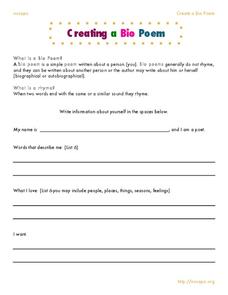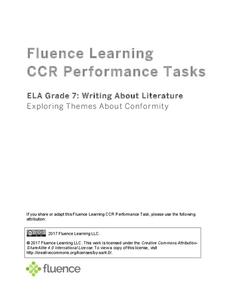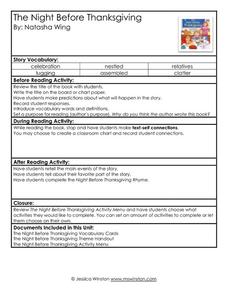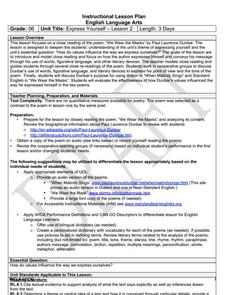Poetry4kids
Rhyme Schemes Lesson Plan
Scholars read four brief poems and analyze their word usage in order to identify the rhyme scheme.
Poetry4kids
How to Write a Limerick
Add a little fun and fancy to English language arts with an activity that challenges scholars to write a limerick. Authors follow five rules in order to compose an original poem that contains a specific rhyme scheme.
Pearson
Langston Hughes
An author study provides learners the opportunity to explore in depth the life of, the influences on, and the works of a single literary figure. Introduce middle schoolers to Langston Hughes with a unit that models how to approach an...
Prestwick House
Discovering Genre: Poetry
Work on literal and figurative meanings with a lesson focused on Robert Frost's "After Apple-Picking" and "The Road Not Taken." Readers identify the literary devices used by the poet to set the poems' themes, settings, and narrative...
Nosapo
Creating a Bio Poem
Find out what's special about your pupils with a fun biopoem activity! As they fill out their name, words that describe them, what they love, and what they dream of, learners create an expressive poem about themselves.
Prestwick House
Rhyme and Repetition in Poe's "Annabel Lee"
Many and many a year ago Edgar Allan Poe crafted the chilling tale of "Annabel Lee." The poem is the perfect vehicle to introduce Poe's concept of unity of effect, the idea that every element in a poem or story should help to develop a...
Prestwick House
"Because I could not stop for Death" -- Visualizing Meaning and Tone
Emily Dickinson's "Because I could not stop for Death" provides high schoolers with an opportunity to practice their critical thinking skills. They examine the images, diction, rhythm, and rhyme scheme the poet uses and consider how...
Fluence Learning
Writing About Literature: Exploring Themes About Conformity
Feeling the pressure to confirm is something any adolescent can relate to. Explore an essential theme with a response to literature assessment that prompts learners to identify main ideas with evidence and supporting details.
Prestwick House
The Poetry of Bob Dylan
Bob Dylan's selection as the 2016 winner of the Nobel Prize for Literature, the first songwriter ever to receive the honor, has focused the attention of a new generation on the work of the legendary artist. Class members analyze the...
Soft Schools
Practice Reading Poetry
Identify the rhyme scheme in a learning exercise that features "Mary Had a Little Lamb." Readers use the nursery rhyme to reinforce poetic elements in four comprehension questions.
E Reading Worksheets
Poetic Devices Finder
Track the poetic elements in any text with a guided reading worksheet. Kids note examples of consonance, alliteration, onomatopoeia, repetition, rhyme, and rhythm when reading a poem or story, and provide a short explanation as to why...
Houghton Mifflin Harcourt
Let’s Count!: Challenge Activities (Theme 5)
Challenge young scholars with a counting-themed series of activities. Your counters will write invitations to a feast, create books about dinner parties and animals, design posters, draw pictures of their favorite peaceful places, and...
Curated OER
The Night Before Thanksgiving
Natasha Wing's story The Night Before Thanksgiving is a great way to incorporate rhyme and literature into the Thanksgiving season. Learners make text-to-self connections, recall main events, and choose post-reading activities from an...
Geography 360°
Poetry Writing
Put the tips and tricks in this guide into practice in order to encourage your pupils to blossom into poets. A wonderful reference material for teachers, this packet includes definitions of poetic terms and forms as well as step-by-step...
Curated OER
6th Grade: Express Yourself, Lesson 2: Close Read
The second instructional activity of a pair about Paul Laurence Dunbar, this plan focuses in particular on his poem, "We Wear the Masks." After a short historical introduction, class members conduct a series or readings, marking up the...
Curated OER
Figurative Language
Explore literary devices and figurative language using higher level examples. The 33 slides here define common types of figurative language (like simile, metaphor, personification, etc.), and then focus on specific examples in...
Curated OER
Gwendolyn the Library Fairy
Students read a story. For this rhyming words lesson, students learn what rhyme is, read Gwendolyn the Library Fairy and identify rhyming words.
Curated OER
Fun With Poetry!
Here's a fun way to introduce your young poets to literary terms associated with poetry. Colorful and filled with examples that illustrate the terms and their definitions, the entire presentation could be used at the beginning of a unit,...
Curated OER
Introduce Vocabulary: Have You Seen Bugs? (Oppenheim)
Are your scholars interested in bugs? Get future entomologists excited about vocabulary through Joanne Oppenheim's colorful book Have You Seen Bugs? They use the informational text (although this strategy is useful for any book) to learn...
Curated OER
Genre Lesson: Poetry
Hook kids into a study on poetry elements by asking them to bring in the lyrics to their favorite song. Discuss the elements in one or two songs (preferably that demonstrate rhyme, figurative language, or a repeating phrase). Groups do...
Curated OER
Understanding the Poem
Practice literary analysis with your poetry pupils using the mysterious narrative poem "The Listeners." They examine the archaic language and answer 12 comprehension and analysis prompts. Foster creativity with these referential...
Curated OER
A Mysterious Story Poem
Your scholars will be hooked after reading the cryptic narrative poem "The Listeners." They explain why it is so mysterious, then use the poem to learn about pronouns. Learners read an excerpt from the poem that has been altered to not...
Curated OER
Sound Blending Lesson Plan
Mr. Snowman wants to help emerging readers understand compound words, so he segments some familiar words to help them see that they are made of two distinct words. Learners repeat the words, both segmented and blended, and observe them...
Curated OER
Introduce Vocabulary: Red Riding Hood (Marshall)
It's the classic story of Little Red Riding Hood retold by James Marshall; scholars listen for six new words as you read: bouquet, charming, escort, horrid, tarry, and wicked. Introduce the words before reading so they can listen for...

























